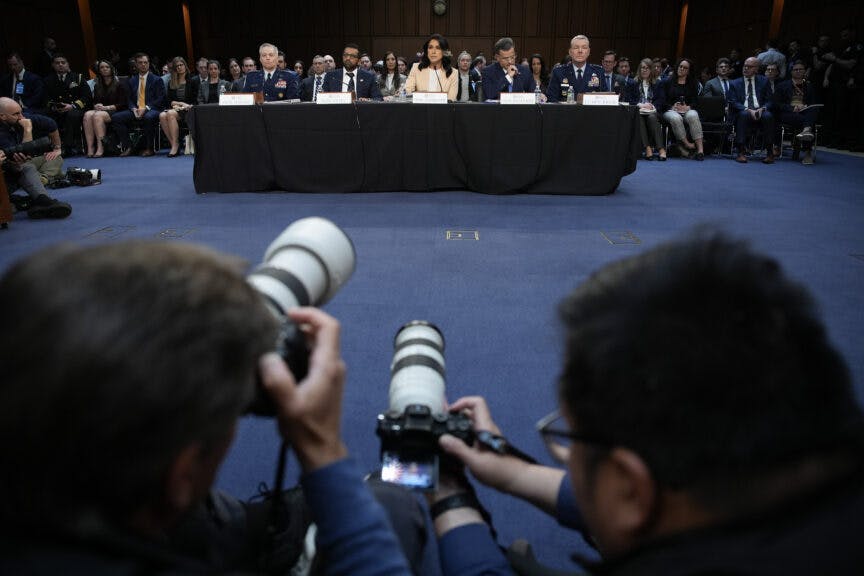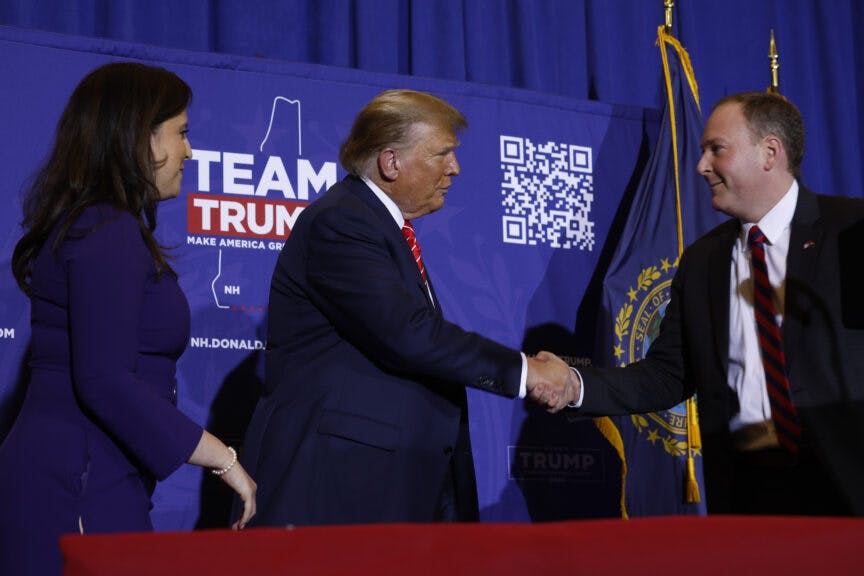National security officials are grilled on Capitol Hill amid dueling accusations over a military strike text chain. Big food companies are fighting to keep soda and snacks on the subsidized menu. And, EPA Chief Lee Zeldin is taking swift action to dismantle cumbersome environmental regulations.
It’s Wednesday, March 26th, and this is the news you need to know to start your day. If you’d rather listen to your news, today’s edition of the Morning Wire podcast can be heard below:
When The Group Chat Leaks…

(Photo by Andrew Harnik/Getty Images)
Advertisement
Topline: Top national security officials were on Capitol Hill yesterday, where lawmakers grilled them on how a journalist was added to a group chat about military operations.
Damage Control… Around two weeks ago, a user named “Michael Waltz” added Atlantic Editor in Chief Jeffrey Goldberg to a Signal group chat where Trump national security officials discussed upcoming strikes on Houthi terrorists. The fallout from that compromised series of communiques, in Washington and in the national press, has been substantial.
Several senior intelligence directors with the Trump administration were already set to testify before the Senate on Tuesday – the hearing naturally became all about the signal chat with Democrats accusing Trump officials of exposing classified information, and the officials defending the administration. CIA Director John Ratcliffe downplayed the severity of the leak in a heated exchange with Senator Jon Ossof (D-GA):
Advertisement
OSSOFF: Director Ratcliffe, this was a huge mistake, correct?
RATCLIFFE: No.
OSSOFF: A national political reporter was made privy to sensitive information about imminent military operations against a foreign terrorist organization, and that wasn’t a huge mistake? This is an embarrassment. This is utterly unprofessional.
Ratcliffe insisted that there was nothing inherently wrong with national security officials discussing military plans on Signal – it was approved under the Biden administration. “One of the first things that happened when I was confirmed as CIA director was Signal was loaded onto my computer at the CIA – as it is for most CIA officers,” Radcliffe testified before Congress. “That is a practice that preceded the current administration to the Biden administration.”
Director of National Intelligence Tulsi Gabbard, also a member of the chat, told Virginia Senator Mark Warner that “there was no classified material that was shared in that Signal chat.”
Advertisement
Trump hasn’t said much about the saga yet, but it seems like he’s standing by Waltz and the entire team. The president told NBC yesterday that Waltz “has learned a lesson, and he’s a good man.” Trump added that he’s not concerned about the story, saying it is “the only glitch in two months, and it turned out not to be a serious one.”
Cutting Fat From The Budget

(Photo by LauriPatterson by Getty Images)
Topline: Food lobbyists are fighting tooth and nail to stop the Trump administration from limiting taxpayer subsidies for junk food.
The Trump administration has made a strong push to restrict soda, candy, and other unhealthy options from purchases being made with SNAP, commonly called food stamps. Proponents say this is necessary in light of America’s obesity and overall health crisis, and chiefly, about how taxpayer money is spent. Federally, these changes have been discussed openly by HHS Secretary Robert F. Kennedy Jr. and Agriculture Secretary Brooke Rollins, who plays a key role in administering these benefits.
There are also numerous bills in the House seeking to restrict junk food and soda from SNAP.
The movement has picked up steam on the state level: Arkansas Gov. Sarah Huckabee Sanders has asked the feds to allow her state to restrict SNAP. Lawmakers have made similar moves in Idaho, Kansas, Arizona, Indiana, Texas, and Wyoming, to name a few. In related news, West Virginia has just passed a bill that bans a number of food dyes often found in junk food and sugary drinks – that will affect the soda industry, too, which ran a strong opposition campaign to that bill. Republican Gov. Patrick Morrisey signed that bill on Monday; it will go into effect in 2028, though it will affect school food programs this summer.
The food industry is working across numerous fronts to protect the profits of these products. About 1 in 8 Americans receive SNAP benefits currently, with soda as the most frequently purchased item. About 10% of all SNAP spending goes toward soda and sugary drinks, and another 10% toward junk food. American taxpayers reportedly subsidize roughly $4 billion worth of soda products through SNAP.
Buttering Trump Up: The American Beverage Association, or ABA, which represents all of those big soda companies, gave money to Trump’s inauguration, as they have for past presidents. Coca-Cola, PepsiCo, and Keurig Dr Pepper have directly engaged with administration officials – talking up their commitment to “zero-sugar” options and clear product labeling. Coca-Cola also famously met with Trump in January to gift him a personalized bottle of Diet Coke.
Walmart has also engaged in lobbying efforts to stop these restrictions, and, believe it or not, there was also a lobbyist from the American Heart Association (AHA) who advocated against these restrictions. As was first reported by The Daily Wire’s Luke Rosiak, the AHA has since claimed that the lobbyist “miscommunicated” the group’s position.
A poll commissioned by the ABA found that 58% of 2024 Trump voters believe food stamps should be allowed to purchase soda. Overall, 64% of those polled agreed. But, again, this was conducted on behalf of the ABA, and it only polled about 800 people. It’s also noteworthy that a significant number of Americans who voted for Trump receive SNAP benefits – likely tens of millions of Americans.
Trump himself has not said anything for or against restricting soda and other junk food from SNAP, though he has empowered RFK to enact his “MAHA” agenda.
EPA Cuts Spending and Regulation

(Photo by Chip Somodevilla/Getty Images)
Topline: The second Trump administration could oversee one of the largest shifts in environmental policy in over a decade. EPA chief Lee Zeldin is leading the transition with an aggressive effort to cut extensive climate regulations.
The Trump administration, and Zeldin in particular, are aggressively attacking Democratic climate policies and green programs. It’s all part of President Trump’s stated goal of energy dominance.
“I am here to fight for part of that Trump mandate earned [on] November 5th,” Zeldin told Fox’s Laura Ingram earlier this month. “[There are] people who cannot afford to be able to heat their home, to purchase a car, small businesses that are struggling to operate. People have been put out of work, and it’s going to end.”
Zeldin wants to reform and repeal dozens of the most burdensome climate rules. That includes, for example, Biden’s electric vehicle mandate that aims to force a radical change to the automobile market with half of new cars sold being all electric by 2032. Zeldin’s EPA has also set its sights on Obama’s 2009 endangerment finding – that rule essentially set the basis for the EPA to police greenhouse gas emissions in the United States and spawned a massive amount of environmental regulation.
Zeldin has also cut and reclaimed funds from climate programs. In a cabinet meeting on Monday, he said that the EPA had cut “over $22 billion worth of contracts,” which had previously been going to.
Trump’s Energy Secretary Chris Wright has worked alongside the EPA to greenlight a lot of oil and gas projects. And Wright has also been cutting regulations on energy producers – so much so that oil and gas executives are reneging on green investment pledges and pausing the transition to green energy that Democrats have wanted.
There was also a major court case punishing Greenpeace for its extreme protest strategies. Last week, it was found liable in a nearly $700 million judgment for helping violent protesters destroy and vandalize property in their attempts to sabotage the Dakota Access Pipeline. The trial revealed that Greenpeace USA organizers had trained protesters and even purchased supplies the protesters used to commit illegal acts.



